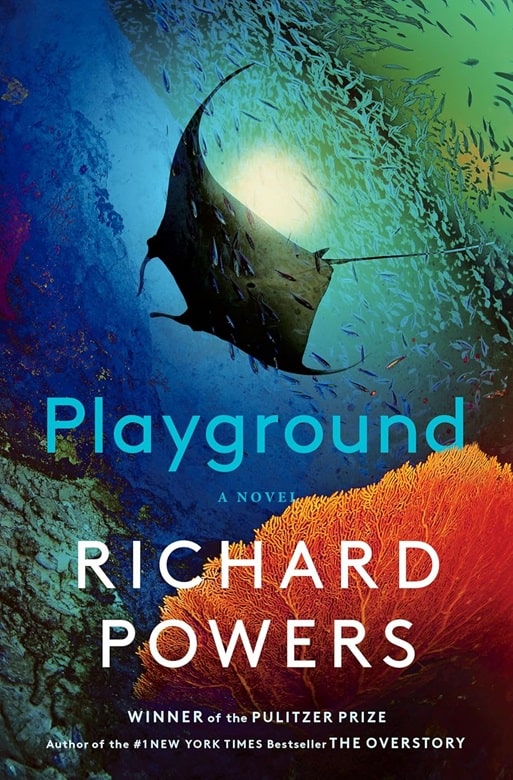Play’s the Thing: Playground by Richard Powers
Playground (W. W. Norton & Company, September 24, 2024)
The ocean covers approximately 70% of Earth’s surface. It’s the largest livable space on our planet, and there’s more life there than anywhere else on Earth…Despite its importance, the majority of our ocean is largely unknown…Scientists estimate there may be between 700,000 and 1 million species in the ocean (mostly animals and excluding most microorganisms, of which there are millions). Roughly two-thirds of these species, possibly more, have yet to be discovered or officially described.
The capacity to play began evolving millions of years ago; it appears to exist in animals dating back 500 million years. As evolution created ever more complex animals, play capabilities expanded too; humans are the most complex and the most playful of all species.
In The Overstory, Richard Powers depicted the concentric connections of the world’s forests and the human tampering with, if you’ll pardon the pun, “roots” of the natural world. In his latest novel, Playground, Powers explores the interrelations among life below and above the sea, as well as the effects of AI on both. But the overstory, if you will, is about the importance and effects of play.
The titular playground is actually several playgrounds and types of play. Rafi Young, a Black scholarship kid, and Todd Keane, a white nepo baby, first meet at a prestigious Chicago high school, bonding first over chess and then over Go, an ancient Chinese board game of strategy played with stones.
The strategies of play (and conflict) later define their estranged adult lives. Rafi moves on from academia to work for an NGO on a French Polynesia atoll where he lives with artist (another type of play) wife Ina. Todd is an elitist billionaire techie who made his fortune developing Playground, a gamified version of Reddit that owes its immense success to a feature suggested by the uncredited and uncompensated Rafi. One twist (and there are many) is that after his sister’s death Rafi became obsessed with a Russian philosopher’s writings on the possibility of resurrecting the dead; Todd , who is suffering from Lew body dementia (which also make his first person recounting of his relationship with Rafi possibly unreliable), is considering AI as a way to actually bring back the dead in some sense. He is also trying to reconnect with Rafi after a misunderstanding (at least in Todd’s telling) ruptures their friendship.
So what’s the ocean got to do with all this? When he was a kid, Todd was obsessed with a young adult oceanography book, Clearly It is an Ocean, to the point where he imagines he can breathe underwater. This book and the notion of living underwater is the connecting tentacle among disparate narratives.
Someone who actually can breathe underwater is Evelyne (Evie) Beaulieu, daughter of another uncredited inventor, that of the first aqualung popularized (and arguably monetized) by Jacques Cousteau. This other intertwining narrative relates Evie’s fascination with the play of life underwater, as well as her struggles as a woman in a male-dominated field of oceanographers and divers. Late in life she comes to live with Rafi and Ina on the island of Makatea, which is undergoing the effects of climate change and manmade pollution (Rafi’s family collects washed up Legos from the famed 1997 cargo ship crash). The small community on the island is debating whether to take up an offer from an anonymous developer to build floating cities for high tech “seasteaders” to escape said climate change and human pollution. The project means jobs and higher living standards for inhabitants of the atoll. But are they just being exploited as they once were for long since abandoned phosphorous mining? What exactly is this anonymous benefactor playing at?
Arguing from both sides of the debate are Ina, who grew up in the Pacific area, and Rafi, who knows a thing or two about how the ruling classes think.
The story shifts among these various characters in ways that make for a heady swim. As with anything Powers, it leaves you thinking about how life is a game that doesn’t really require winning so much as trying to ride the waves.
David Soyka is one of the founding bloggers at Black Gate. He’s written over 200 articles for us since 2008. His most recent was a review of The Shadow of the Wind by Carlos Ruiz Zafón.

[…] Check out my latest review at Black Gate. […]